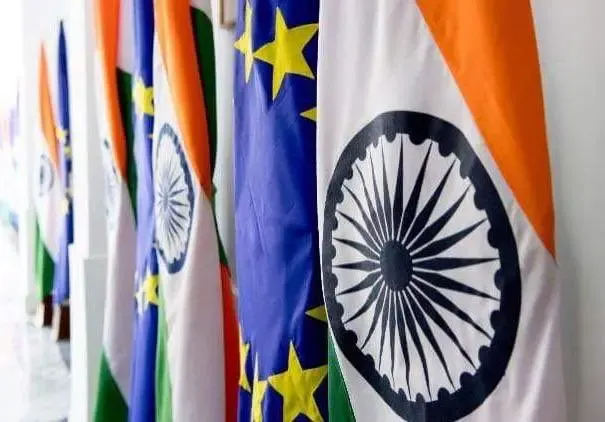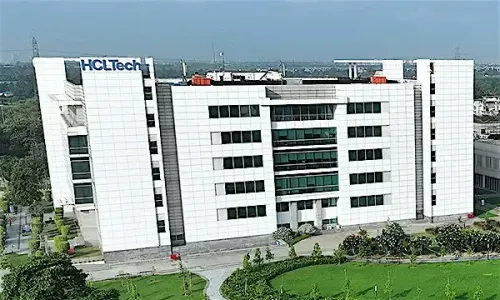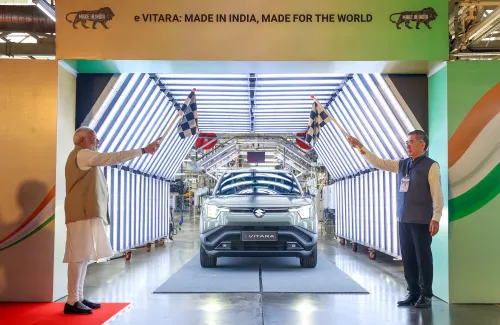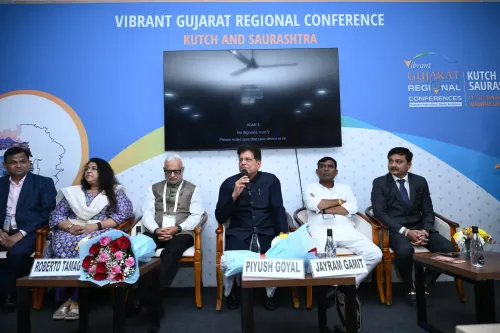What is the EU's New Strategy to Enhance Prosperity and Security with India?

Synopsis
Key Takeaways
- New Strategic EU-India Agenda unveiled to deepen cooperation.
- Focus on enhancing trade and investment.
- Strengthened defence collaboration.
- Regional connectivity initiatives prioritized.
- Addressing global challenges through enhanced ties.
Brussels, Sep 17 (NationPress) The European Commission and the High Representative on Wednesday unveiled a Joint Communication detailing a ‘New Strategic EU-India Agenda'. This initiative aims to deepen, broaden, and enhance coordination of bilateral cooperation, advancing prosperity and security for both parties to address significant global challenges.
European Commission President Ursula von der Leyen introduced the strategy as part of the 2024-2029 Political Guidelines. She emphasized that the EU is elevating its ties with India by promoting trade, investment, and talent mobility, while also fortifying industrial collaboration in the defence sector.
“Now is the time to focus on reliable partners and deepen partnerships grounded in shared interests and aligned by common values. With our new EU-India strategy, we are advancing our relationship to new heights. This includes boosting trade, enhancing investment, and fostering talent mobility. We are committed to strengthening our economic security and driving innovation together,” Leyen stated.
“We are intensifying our industrial cooperation in defence. Europe currently stands as India's largest trading partner, and we aim to finalize our Free Trade Agreement by the year's end. Europe is ready for business, and we are eager to invest in our shared future with India,” she added.
The Joint Communication articulates the EU's strategic approach to fortifying collaboration with India, pinpointing five areas of mutual interest and complementary strengths, building upon existing relationships while exploring opportunities for enhanced engagement. Given the shifting geopolitical landscape, closer EU-India ties are crucial for economic growth, security, and diversifying supply chains in response to today's unpredictable global environment, as noted in an EU statement.
“The Joint Communication advances the proposed EU-India Security and Defence Partnership. This initiative will boost strategic consultations and collaborative efforts on crisis management, maritime security, cyber defence, and counterterrorism, while promoting defence industrial cooperation aimed at enhancing production capabilities, securing supply chains, and stimulating innovation,” it mentioned.
“Initiating negotiations for a Security of Information Agreement will facilitate classified information exchange and enhance security and defence collaboration. Areas of focus also include closer cooperation in the Indo-Pacific, addressing hybrid threats, space security, and intensifying dialogue regarding Russia's war against Ukraine, shadow fleets, and sanctions,” the statement added.
The Joint Communication emphasizes the importance of strengthening regional connectivity initiatives, such as the India-Middle East-Europe Economic Corridor (IMEC) and advancing Global Gateway and EU-India trilateral cooperation with third countries. It calls for greater interaction and coordination between India and the EU at all levels, including skills mobility through the pilot European Legal Gateway Office to facilitate labour mobility. It advocates for the development of a comprehensive mobility cooperation framework covering study, work, and research.
“The Joint Communication identifies significant untapped potential in trade and investment, outlining strategies to fortify commercial ties, particularly by concluding ongoing negotiations on a Free Trade Agreement (FTA). It proposes enhancing supply chains while promoting critical emerging technologies and engaging on digital issues, with particular attention to improving economic security within the Trade and Technology Council (TTC),” the EU stated.
“This new strategy also proposes strengthening tech collaboration, potentially through an EU-India Startup partnership, and invites India to engage with the Horizon Europe programme. It suggests ambitious initiatives for decarbonisation and the clean transition, such as intensifying cooperation on renewables, developing green hydrogen capabilities, and expanding green finance. Additionally, it highlights opportunities to jointly bolster food security and enhance resilience in health, climate, and disaster management,” it added.
Kaja Kallas, the High Representative for the EU's Foreign Affairs and Security Policy, referred to India as “a key player on the global stage and a natural partner for the European Union.”
She stated, “India is currently one of the most significant players in the world and a natural partner for the European Union. There are numerous areas where our interests, strengths, and political will align. Enhancing our collaboration— which we propose today—will benefit the security and prosperity of citizens and businesses on both sides. While there are areas of disagreement, ultimately our partnership is about defending a rules-based international order. Our negotiations will address these challenges.”










